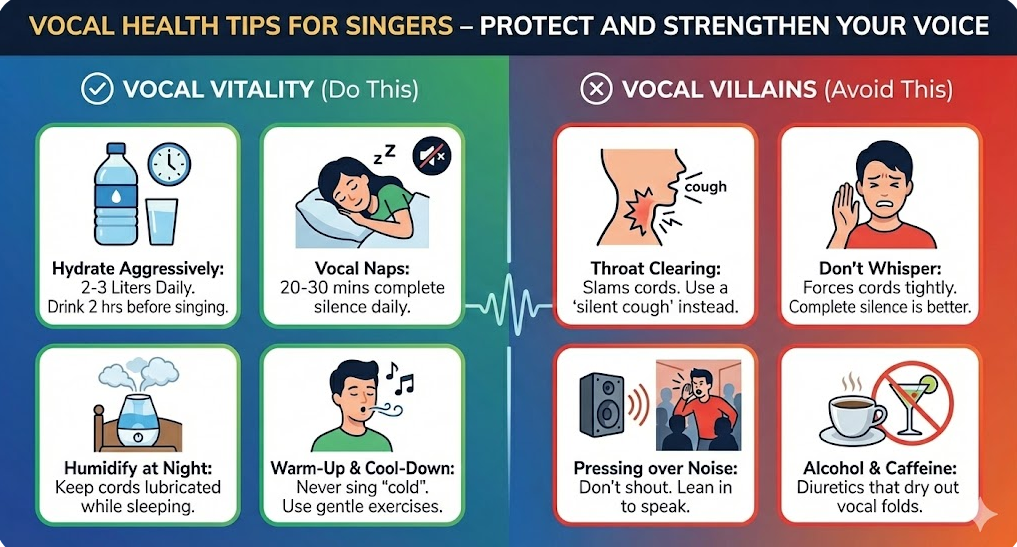A healthy voice is the foundation of great singing. Whether you’re a professional singer, choir member, or just starting, taking care of your vocal cords keeps your voice strong, flexible, and ready for performances.
This guide shares practical vocal health tips to help you avoid strain, sing with freedom, and maintain vocal stamina for years to come.
If you haven’t checked your vocal range yet, Knowing your range helps prevent over-singing or pushing beyond your limits.
Why Vocal Health Matters
Your vocal cords are delicate muscles. Like athletes train their bodies, singers must train and protect their voices. Healthy vocal cords allow you to:
- Sing longer without fatigue
- Reach higher or lower notes safely
- Avoid injuries like nodules or laryngitis
- Maintain tone quality and projection
Ignoring vocal care often leads to hoarseness, reduced range, or long-term vocal damage.

Daily Vocal Health Tips for Singers
Here are essential habits to keep your voice healthy every day:
1. Stay Hydrated
- Drink room-temperature water throughout the day
- Avoid ice-cold drinks before singing; they can tighten vocal muscles
- Warm teas (without caffeine) can soothe the throat
2. Warm Up Before Singing
Never sing on a “cold” voice. Use Daily Vocal Warm-Up Exercises for 5–10 minutes before practice or performance.
Warm-ups improve:
- Blood flow to vocal cords
- Flexibility in registers
- Breath control and tone stability
3. Rest Your Voice When Needed
Vocal rest is as important as practice. After long rehearsals or performances:
- Take short periods of complete silence
- Avoid loud talking, shouting, or whispering
Even professional singers schedule vocal rest days each week.
4. Practice Proper Breathing
Breath support reduces strain on your throat muscles. Learn Breathing Techniques for Singing to:
- Engage your diaphragm
- Control airflow for sustained phrases
- Maintain steady tone quality
5. Avoid Smoking and Excessive Alcohol
- Smoking irritates and dries out vocal cords
- Alcohol and caffeine dehydrate the body, affecting vocal flexibility
Choose hydration-friendly alternatives like water or herbal teas instead.
6. Maintain Good Posture
Proper posture keeps airways open for better breath control:
- Stand tall, shoulders relaxed
- Keep your neck and jaw free of tension
- Balance weight evenly on both feet
7. Control Vocal Volume
Singing loudly without technique strains your cords. Use microphones for performances instead of shouting to reach high volume.
8. Get Enough Sleep
Fatigue affects vocal strength and breath control. Aim for 7–8 hours of sleep to keep your voice and body healthy.
9. Manage Allergies and Reflux
- Allergies can cause throat irritation or mucus buildup
- Acid reflux can damage vocal cords over time
Consult doctors for treatments if these issues affect your singing.
10. Use Steam for Vocal Hydration
Inhaling steam keeps vocal cords moist and flexible.
- Use a bowl of hot water or a personal steamer
- Inhale gently through your mouth for 5–10 minutes
Our Interactive Tools
- Vocal Range Test – find your exact highest and lowest notes online in seconds.
- Vocal Range Calculator – measure and record your range accurately using your microphone.
- Singer Comparison Tool – compare your vocal range with famous singers and see where you align.
- AI Voice Analysis – get instant feedback on your tone, pitch stability, and clarity through advanced AI.
- Song Key Finder – discover songs that naturally fit your vocal range and tessitura.
- Ear Training Game – improve pitch accuracy and interval recognition through fun listening challenges.
- Microphone Tester – check your mic setup before testing your range or recording vocals.
Nutrition for Healthy Singing
Foods that support vocal health:
- Fresh fruits and vegetables
- Lean proteins for muscle recovery
- Whole grains for energy
Foods to avoid before singing:
- Dairy products (can cause mucus)
- Spicy or acidic foods (may irritate the throat)
- Carbonated drinks (can create gas pressure)
Warm-Up and Cool-Down Routines
Like athletes, singers need both warm-ups and cool-downs:
- Warm-Ups: Lip trills, humming, sirens (before singing)
- Cool-Downs: Gentle humming or soft singing scales after practice
Cooling down relaxes vocal cords and prevents post-singing tightness.
Common Vocal Health Mistakes to Avoid
- Skipping warm-ups before singing demanding songs
- Ignoring vocal pain or hoarseness instead of resting
- Forcing high notes without proper training
- Talking loudly in noisy environments after singing
- Dehydration during rehearsals or performances
Daily Vocal Care Routine for Singers
| Time of Day | Vocal Care Activity |
|---|---|
| Morning | Drink water, gentle humming warm-ups |
| Pre-Practice | 5–10 min warm-up routine |
| During Singing | Stay hydrated, maintain posture |
| After Singing | Cool down with light humming |
| Evening | Avoid shouting, stay hydrated, rest voice |
When to See a Vocal Coach or ENT Doctor
Seek professional help if you notice:
- Frequent hoarseness lasting more than 2 weeks
- Sudden loss of vocal range or power
- Pain while speaking or singing
An ENT (Ear, Nose, and Throat) specialist or voice therapist can diagnose issues early and prevent long-term damage.
Long-Term Habits for Strong Vocals
- Record and review your singing weekly
- Practice Expand Vocal Range Safely exercises for range improvement
- Schedule vocal rest days each week
- Take vocal training classes for technique refinement
FAQs About Vocal Health for Singers
Q1: How do I prevent losing my voice after singing?
Stay hydrated, rest after long sessions, and avoid shouting or whispering.
Q2: Is vocal warm-up necessary every day?
Yes, warm-ups keep your vocal cords flexible and prevent strain.
Q3: How much water should singers drink?
At least 2–3 liters daily, sipping consistently rather than all at once.
Q4: Can diet affect singing voice quality?
Yes, hydration-friendly foods improve tone; dairy and acidic foods may irritate vocal cords.
Q5: How often should I rest my voice?
Take short rests daily and one full rest day per week if singing frequently.
